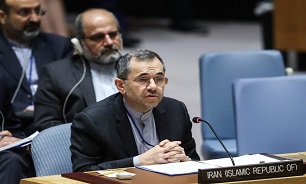 Relations between Iran and China “go back centuries. So, it is natural for these two countries to get together, to discuss different issues, (and) collaborate on many issues of interest to both sides, including in the field of economy,” Majid Takht Ravanchi told RT on Thursday.
Relations between Iran and China “go back centuries. So, it is natural for these two countries to get together, to discuss different issues, (and) collaborate on many issues of interest to both sides, including in the field of economy,” Majid Takht Ravanchi told RT on Thursday.
“So the agreement between Iran and China is not something unusual. We are in the process of finalizing the deal, which affects both countries,” as it “deals with many issues of interest for both sides and I think it is natural for … two countries to sign such an agreement provided that this is something necessary for two sides,” Iran’s envoy said.
The agreement is to serve as a “roadmap” defining the quality of the countries’ strategic relations for the subsequent 25-year period. It is expected to ditch the dollar in bilateral trade by bringing in each side’s legal tender instead and bypass the illegal and unilateral sanctions that the United States returned against the Islamic Republic in 2018.
The roadmap is expected to enable such level of coordination between Tehran and Beijing that could eat away at Washington’s sway in the region and further frustrate its attempts at isolating Tehran.
Takht Ravanchi was then asked if the Islamic Republic was hammering out the agreement with China because it can’t come to a deal with the United States and because the US has pushed Iran away.
“No,” he asserted, saying the deal “has nothing to do with the US."
Iran and China’s relations go long back in history, the ambassador said, and declared that the two countries were “natural friends” both interested in “a strategic alliance.”
On the other hand, Iran is "not interested to beg anything from the United States,” the official noted.
It was Washington, itself, that left the negotiation table in the first place by leaving a historic 2015 nuclear deal between Iran and world powers and then re-imposed the sanctions that the deal had lifted, he stated.
Takht Ravanchi, meanwhile, reminded that the reinstated US bans have blocked transfer of “food and medicine” to the Islamic Republic among other items, refuting Washington’s claims that such data-x-items were “exempt” from the coercive measures.
The envoy was also asked how Iran would act vis-� -vis the US if Democratic frontrunner Joe Biden, who has supposedly floated Washington’s return to the nuclear deal, was supposed to win the 2020 US elections.
The JCPOA was clinched during the administration of previous US President Barack Obama. Biden, who is now in the race for the upcoming US presidential elections, was the vice president in the then US administration.
“As soon as” Washington returns to the deal and acts like a “normal country” that upholds its commitments under it, then “they can join the other members of the JCPOA … and have a normal discussion about the nuclear issue,” Takht Ravanchi said, referring to the agreement by the abbreviation of its official name, the Joint Comprehensive Plan of Action.
